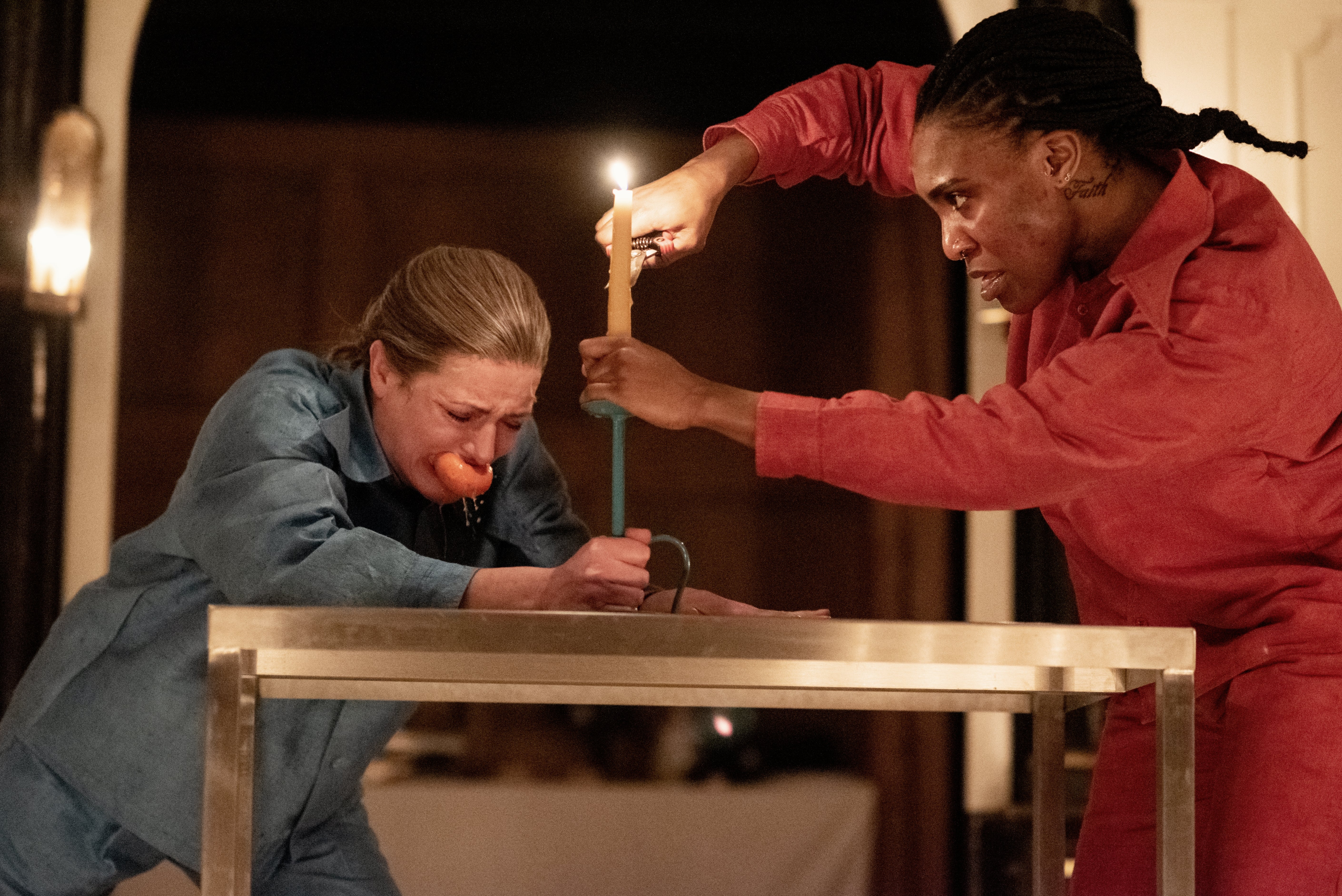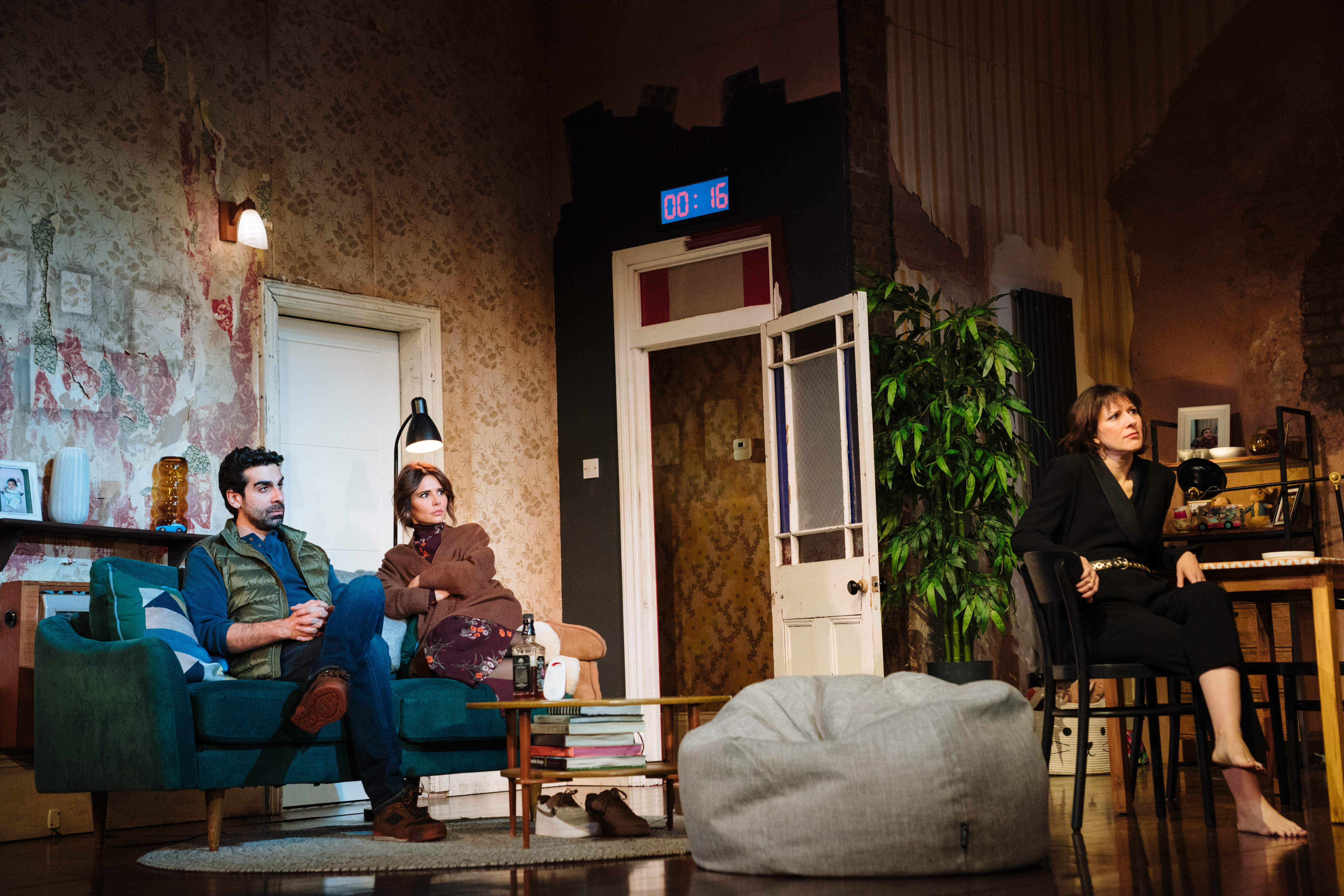
This week, Cheryl makes her West End debut, Aidan Turner and Jenna Coleman star in a futuristic romcom, and there’s a gore-free Titus Andronicus at Shakespeare’s Globe.
Lemons Lemons Lemons Lemons Lemons – Harold Pinter Theatre ★★★☆☆
“Hip hop is as good as dead.” In Sam Steiner’s spirited play, it’s one of the many casualties of the “hush law”, which restricts citizens to 140 words a day. Also not long for this world are presentations, wedding speeches and epic poetry. And there are greater problems still. It will be hard to challenge those in power. Nepotism will thrive (job interviews take up too many words). And what about children – will they just “have to be very concise from a very young age?”
These are the issues debated by a young couple in Steiner’s dystopian romcom, first staged at the Edinburgh Fringe in 2015. Jenna Coleman is Bernadette, a passionate lawyer from a working-class background. She sleep-talks, which means she’ll have to gag herself at night. Aidan Turner is Oliver, a preening musician who is engaged in a protest movement against the law. There’s a lot of fun to be had with this concept, which feels slightly dated by the clear influence of Twitter (a platform that’s long since jumped the shark) but fluid enough to keep us thinking. Words become something to preserve for one another, withhold in anger, or accidentally waste in the search for expression. The law doesn’t just hamper communication, but cuts short the innately human quality of being curious.

The actors make for a charming duo, with Coleman particularly strong as quick-thinking Bernadette, who doesn’t always need words to understand what is going on. And Steiner’s writing is genuinely exciting – fresh, funny, thoughtful. But it feels overstretched on a West End stage, and the production doesn’t match the inventiveness of the script. There’s obviously something nice about the fact it’s been plucked from its fringey origins for a starry West End show. But if theatre believes in new writing talent, shouldn’t Steiner have been commissioned to write a new play, one that is suited to a bigger stage? Jessie Thompson
Titus Andronicus – Shakespeare’s Globe ★★★★☆
In 2006, the Globe put on a splatter-fest production of Titus Andronicus. Since this is the Bard’s bloodiest drama, about a Roman general drama and a new empress out to destroy one another in the most devastating and graphic way possible, it’s no surprise that the production was gory in the extreme. An average of two people passed out during each performance. This year, the Globe stages the same play – this time with an all-female and non-binary cast directed by Jude Christian. When a guillotine is rolled out on stage in the opening minutes, I thought, “Oof. Here we go again.” But moments later, it’s clear that’s not what Christian has in store for tonight.
The production comes with all the necessary trigger warnings – cannibalism, rape, racism, self-harm – but, this time, the gags come not from the audience, but the actors, who revel in the farcical elements of the violence. The tone is quickly established as something altogether different when the cast launch into a jolly performance of a song written by cabaret legends Bourgeois & Maurice. In it, they give the audience a taste of what to expect. (Admittedly, the lyric describing Titus as “torture porn but artistic” is very accurate.) That tone continues throughout, with regular comic set pieces, many delivered brilliantly by Lucy McCormick’s lascivious sleazeball emperor and Beau Holland, who plays eight characters in total, including Fly.

Leaning on the play’s comedy side is easier given that not one drop of blood is spilt across the two-and-a-half hour runtime (compare that with 156 litres used in Lucy Bailey’s 2006 production). There is, however, a great deal of candle wax on the floor. In a gore-free approach to Shakespeare’s gore-fest, Christian has used candles in lieu of flesh. Each of the actors carry a lit candle, which is snuffed out when they are killed. Sometimes the executions are delivered with a quick puff of air as swift as a blade. But more often, they are dragged out in torturous detail. Across the play, candles meet a fate far worse than death. They are pummelled with a mallet, pushed through a meat grinder, pinched apart with pliers, and thrown into a blender. Most of the time, it’s for laughs. But there’s a serious undertone to this visual idea: suddenly, the play’s horrible, hard-to-stage climax becomes far easier to endure. Annabel Nugent
2:22 A Ghost Story – Lyric Theatre ★★★☆☆
When Cheryl (no surname) emerges onto the stage for her West End debut in 2:22 A Ghost Story, it’s tantalising. When she finally faces us, it’s with a glass of wine in hand and a scarf wrapped in her hair. Gone is the glamorous pop star, the X Factor judge: Cheryl the actor stands before us. But is she any good? Actually, yes.
It’s 2.20pm and Jenny and her husband Sam (Scott Karim) are alone in their new home. Their infant daughter sleeps upstairs while Jenny clings to the baby monitor; another couple, Lauren and Ben, are coming over for a drink this evening. But when they arrive and the wine starts flowing, the cause of Jenny’s paranoia becomes clear. At 2:22am every night, she hears strange noises in the baby’s room and is convinced it’s a ghost.

As Jenny, Cheryl gives a confident, measured performance. Her Geordie accent may be instantly recognisable, but she fully inhabits the role. She excels in the show’s quieter, more naturalistic moments, and has a knack for comic timing. Her performance is all the more impressive, given the clichéd dialogue that makes up Danny Robins’ script. A lot of the time, the cast are required to shout at each other, the strain on Cheryl’s vocal cords audible.
But for its faults, I can’t deny the enjoyment I got out of 2:22, which is far funnier than it is scary. The show has spawned memes for its unconventional casting, so which star will be Jenny next? Amanda from The Traitors? Maya Jama? Molly-Mae Hague? I wait with bated breath. Isobel Lewis







